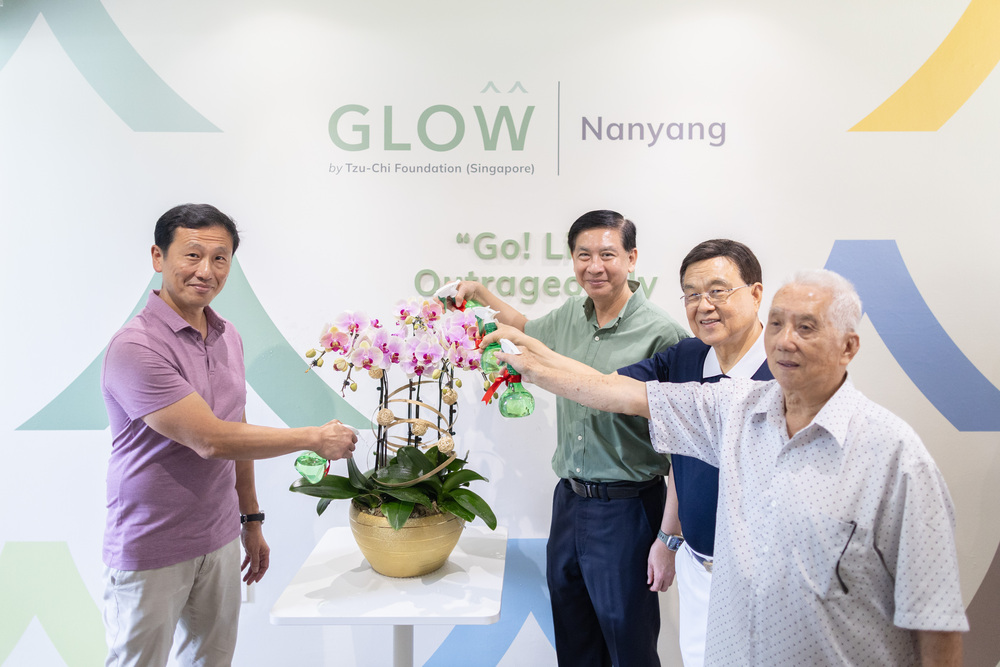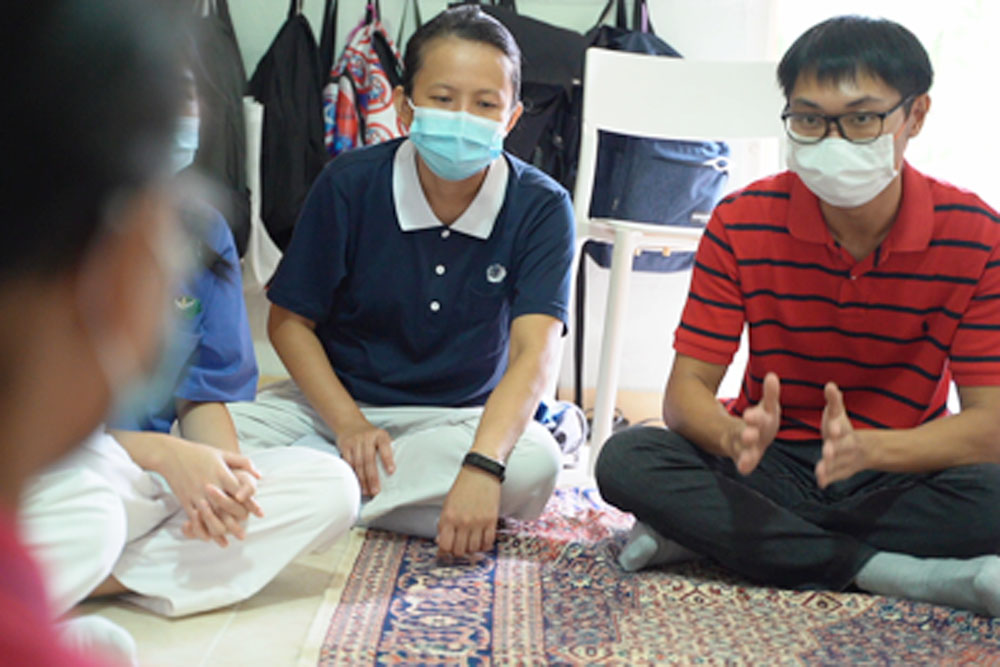
Speaker Lee Mei Ping (standing), a Principal Consultat from Goshen Consultancy Services Pte Ltd, shares with Tzu Chi volunteers the art of communicating with the elderly. (Photo by Teoh Moh Sang)
“Nowadays I seem to hear that societal problems are those that have to do with elderly folks, so I say, ‘Why are old folks seen as problematic, I myself am also an elderly person.' The success of our youths is due to the nurturing efforts by the older generation. Today’s talents are all the grandchildren of the elderly population, so the elderly most certainly are not a problem.”
These humorous words by Tzu Chi's founder, Dharma Master Cheng Yen, evoked laughter amongst viewers of the video. Yet it highlighted the misconceptions that our modern society has of the elderly, and how this segment of the population has been neglected.
As the population of Singapore ages, statistics show that 13% of the population is above 65 years of age. By 2030, the number of senior citizens will hit 900,000. Over the years, Tzu Chi’s local volunteers have, through home visits, provided companionship to many elderly folks bereft of kith and kin who were living out their twilight years alone. In the organization too, many are silver-haired volunteers who tirelessly contribute of their time and efforts to benefit others.
Aging is an inevitable part of life, but with small families more the norm than exception today, not everyone is used to interacting with the elderly. On 22 July 2016, Tzu Chi Singapore invited consultant Lee Mei Pingto address the topic of how to communicate with the elderly effectively. The 82 volunteers who attended benefitted from the insights gleaned as they prepared to put their knowledge to good use in the planned house visits to beneficiaries in the upcoming months.
Discovering the Hidden Needs of Others
In conjunction with the “International Day of Older Persons,” the National Council of Social Services (NCSS) has initiated a day for the celebration of gratitude towards caregivers of the elderly since 2015, thereby encouraging senior citizens to show their appreciation to these parties.
According to speaker Lee, who is from Goshen Consultancy Services Pte Ltd, the elderly will benefit in three main ways if they have a grateful attitude. They are: reducing the odds of being isolated from society, improving physical and mental health, and building up resilience. Explaining that it is not easy to get an elderly person to be grateful and express their thanks as their life experiences differ from ours, Lee related an instance where she encountered an elderly person who retorted, “What do I have to be grateful for? My life has been hard!”
A friendless elderly may have once been a successful businessman; a forgetful 95-year-old longs to be independent—these two simple examples illustrate an important principle behind helping others, that of how crucial it is to discover the true needs of the other party that is hidden beneath the surface. Though everyone hopes to be loved and respected, Li reminded volunteers not to be in a rush to help, but to firstly observe in which aspect aid is required.
Towards the elderly, many people have the attitude that can be summed up as such: “No worries as I will take care of you.” Lee bemoaned this state of affairs as while their living needs have been taken care of, the elderly are not able to exercise their wish to do what they want.
This sharing was particularly meaningful for Tzu Ching seniors (volunteer leaders of Tzu Chi Collegiate Youth Association) Cai Wen Qian and Zen Cui Yi, who regularly lead the youths in visiting the SASCO Senior Citizens’ Home. They had taken a two-hour bus ride to attend the talk held at the Jing Si Hall in Pasir Ris, so that they could share what they had learnt with their peers.
Cai said she realised that one should not jump into conclusion based on their own preconceived ideas but should instead spend time to understand the true needs of an individual.
Skilful Means to Deal with Communication Barriers
To communicate effectively, one must first understand oneself as well as the other party. Lee summarized the commonly seen barriers of communication into three main types, namely: an elderly person reacts with a negative response no matter what topic is discussed, the elderly in question clings on to his own views, or displays reticence. Remembering their own experience, members of the audience nodded in agreement with Lee’s vivid descriptions.
Lee told volunteers that overcoming the obstacles in communication requires one to know their own strengths, and to develop and use these strengths to advantage.
“Are you good at supporting others, listening to them or understanding them? Actually, a good volunteer is not one who has a special ability; as long as you leverage on your strength, you can be of help to others.”
”When an old person tells you how good it would be if he was dead, how would you respond?”
Stumped by Lee’s question, volunteers could not offer any answers. Lee proceeded to explain systematically that the first obstacle was “verbal negativity” and volunteers should acknowledge and accept the viewpoints, emotions and actions of the other party. This constitutes “acceptance.”
By listening attentively and without prejudice to what the other party has to say, the latter will perceive that volunteers are interested in their story. Subsequently, if one repeats what was heard and reflects on what was said , the other will have the opportunity to clarify further. Finally, one can offer a response such as: “After hearing your story, it is understandable that you feel this way.”
Volunteer Zeng Xiang Guang feels that this method offers much practical benefits. In the past, he would have lightly brushed away the negative comment, without realizing that the other person could be harbouring deep emotions that could be easily verbalized. “Reflecting on what the elderly folks say is an extremely useful method,” he remarked.
In dealing with the second type of communication barrier volunteers may encounter i.e. obstinacy of viewpoints, Lee suggested the technique of asking appropriate questions to counter this. There are four principles in this technique: Firstly, the usage of “what” and “how” questions to aid the other party in expanding his radius of thought. If one uses “why” in framing the questions, one may come across as being interrogative and not genuinely interested in seeking to understand the latter.
The second principle that volunteers should bear in mind is: what is the purpose of this communication? Lee then proceeded on to the third principle of “positive exploration,” explaining that people often judge others from their own viewpoints and feel that it is the other person who should change. Very few would stop to ask, “Do you wish to change?”
“Actually, (to have) true respect for a person, one has to respect his viewpoint,” said Lee.
The fourth principle utilizes the Socratic questioning method, where one can try guiding the other party to understand how he has formed his opinions. In this way, one puts the latter in the driver’s seat, allowing him to do self-reflection and seek his own answers.
With the third kind of communication obstacle, Lee advised volunteers to accept the reticence that is displayed and allow the other party some time. Subsequently, with the benefit of acute observation, a suitable topic can be introduced for conversation. Lee stressed that when an elderly person is less than chatty in the presence of a volunteer, it does not indicate an attitude of dislike, rather it may express a feeling of trust in that volunteer.
Finding the Gratitude in One’s Heart
The next challenge after dealing with communication barriers is to inspire gratitude in the hearts of the elderly and get them to write it down. Lee listed out three themes that volunteers might work on: “one’s life’s focus”, “the person who has great influence (on one)”, and “the values, beliefs and principles of an elderly person”.
Every volunteer attending the talk that day was given a beautifully designed Thank You card which came with the material to fold a paper hydrangea. This was a specially designed card that the National Council of Social Service (NCSS) has come up with for the activity in which the elderly will be encouraged to show gratitude. It was hoped that a beautifully folded hydrangea would provide volunteers and the elderly the opportunity to interact further.
Soon, every volunteer was seen with bent heads, and from the efforts of nifty finger-work, paper hydrangeas “bloomed.” Home visit volunteer Liao Xiu Tian followed the instructions carefully and in no time, her hydrangea was completed. As a silver-haired volunteer herself, she patiently demonstrated to the other volunteers how to fold the flower.
When Liao visits the home of a beneficiary, she will enquire warmly about the health of the occupants and has never experienced communication barriers. She said that volunteers have always employed love and sincerity in their interactions with the elderly, who in turn can feel it. She commented that the activity to get the elderly to express gratitude is of great benefit to them, and cannot wait to share it with them during the next house visit.
The Tzu Chi Charity Mission hopes that the house visit volunteers can complete this meaningful activity with their elderly beneficiaries within the next three months. In August , during the island-wide Charity Day, they plan to focus on the topic of their beneficiaries’ inner emotions, and in September, facilitate their participation in the activities of folding paper flowers and penning down Thank You cards. Finally in conjunction with the International Day of Older Persons, Tzu Chi will arrange for elderly beneficiaries to personally hand these gifts to those they wish to express their thanks to during the Charity Day home visits at the beginning of October.

Tzu Ching Cai Wen Qian (first from right) realized that one should spend more time understanding the hidden needs of the elderly instead of jumping into conclusions based on one’s own preconceived notions. (Photo by Teoh Moh Sang)

Volunteer Zeng Xiang Guang expressed his view that reflecting on the other party’s speech is a very useful method of communication. (Photo by Teoh Moh Sang)

Participants engrossed in folding their paper flowers during the segment devoted to this activity. (Photo by Chen Qian Rong)

Home visit volunteer Liao Xiu Tian (centre) shared with the audience that they show love and earnestness in their communications with beneficiaries who can feel their sincerity. (Photo by Teoh Moh Sang)



